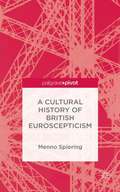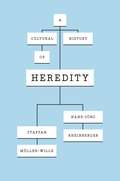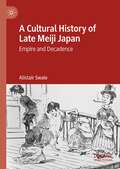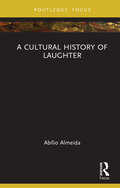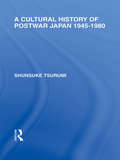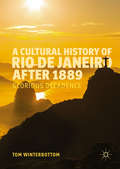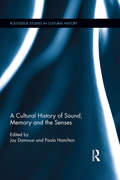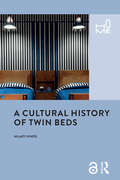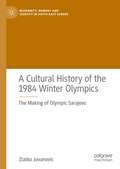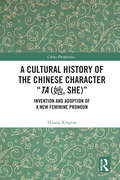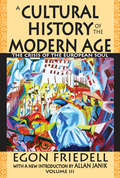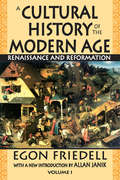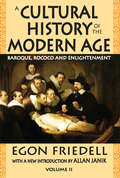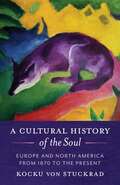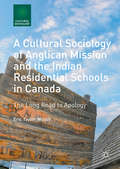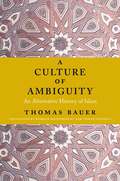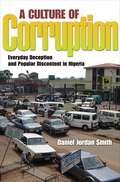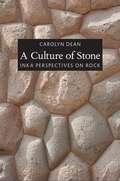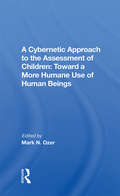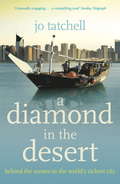- Table View
- List View
A Cultural History Of The British Census
by Kathrin LevitanThe book explores the hotly disputed process by which the census was created and developed and examines how a wide cast of characters, including statisticians, novelists, national and local officials, political and social reformers, and journalists responded to and used the idea of a census.
A Cultural History of British Euroscepticism
by Menno SpieringWhy are the British so Euro-sceptic? Forget about tedious treaties, party politics or international relations. The real reason is that the British do not feel European. This book explores and explains the cultural divide between Britain and Europe, where it comes from and how it manifests itself in everyday life and the academic world.
A Cultural History of Heredity
by Hans-Jörg Rheinberger Staffan Müller-Wille&“Thought-provoking…any scientist interested in genetics will find this an enlightening look at the history of this field.&”—Quarterly Review of Biology It was only around 1800 that heredity began to enter debates among physicians, breeders, and naturalists. Soon thereafter, it evolved into one of the most fundamental concepts of biology. Here, Staffan Muller-Wille and Hans-Jorg Rheinberger offer a succinct cultural history of the scientific concept of heredity. They outline the dramatic changes the idea has undergone since the early modern period and describe the political and technological developments that brought about these changes. They begin with an account of premodern theories of generation, showing that these were concerned with the procreation of individuals rather than with hereditary transmission, and reveal that when hereditarian thinking first emerged, it did so in a variety of cultural domains, such as politics and law, medicine, natural history, breeding, and anthropology. The authors then track theories of heredity from the late nineteenth century—when leading biologists considered it in light of growing societal concerns with race and eugenics—through the rise of classical and molecular genetics in the twentieth century, to today, as researchers apply sophisticated information technologies to understand heredity. What we come to see from this exquisite history is why it took such a long time for heredity to become a prominent concept in the life sciences, and why it gained such overwhelming importance in those sciences and the broader culture over the last two centuries.
A Cultural History of Late Meiji Japan: Empire and Decadence
by Alistair SwaleScholarship on Japan’s development from the late nineteenth century to the early twentieth century has, perhaps quite understandably, been dominated by attention given to Japan’s emergence as a world power through a succession of military conflicts, and the burgeoning of a modern literary canon. This book argues that the emergence of empire and high culture needs to be more thoroughly integrated with an awareness of popular culture in urban life, a culture that at times exhibited a less than whole-hearted enthusiasm for the trappings of 'civilization', - a culture that was, in a sense, ‘decadent’. It integrates coverage of popular culture across diverse media and platforms, accentuating the emergence of new modern forms that evolved from the inter-relation between textual, visual and performative traditions such as kōdan and gidayū. The commentary is seasoned with reference to contemporary narratives, aiming to capture more ‘on the street’ perceptions of momentous events such as war and natural disasters, as well as the more arcane or curious media sensations of the moment. These included exposés of scandalous conduct in high places, new fads in popular entertainments and riveting stories of human interest whether it be crime or tragedies of modern urban living.
A Cultural History of Laughter (Morality, Society and Culture)
by Abílio AlmeidaIs laughter a sin? Or is it man’s best medicine? Is laughter now trivialised, mechanised or even weaponised by contemporary media? This book explores the social history of laughter in the West, from classical antiquity to the present day.Engaging with a range of thought from Plato to Nietzsche, it moves from classical to modern thought, considering the changing emotional climate of societies – including the postmodern "dictatorship of happiness" – and the role played by the technological changes of the last century in shaping our interpretation of laughter.A broad, historical study of the physical and emotional aspects of laughter, as well as its social role, A Cultural History of Laughter will appeal to scholars of sociology, history and cultural studies, among other fields of knowledge.
A Cultural History of Postwar Japan: 1945-1980 (Routledge Library Editions: Japan)
by Shunsuke TsurumiShunsuke Tsurumi, one of Japan’s most distinguished contemporary philosophers, continues his study of the intellectual and social history of modern Japan with this penetrating analysis of popular culture in the post-war years. Japanese manga (comics), manzai (dialogues), television, advertising and popular songs are the medium for a revealing examination of the many contradictory forces at work beneath the surface of an apparently uniform and universal culture. The author argues that the iconography of these popular forms has deep and significant implication for the development of Japanese national life in the post-growth years that lie ahead.
A Cultural History of Rio de Janeiro after 1889: Glorious Decadence
by Tom WinterbottomThis book studies architecture andliterature of Rio de Janeiro, the "Marvellous City," from the revolution of1889 to the Olympics of 2016, taking the reader on a journey through thehistory of the city. This study offers a wide-ranging and thought-provokinginsight that moves from ruins to Modernism, from the past to the future, fromfutebol to fiction, and from beach to favela, to uncover the surprisingfeature--decadence--at the heart of this unique and seemingly timeless urbanworld. An innovative and in-depth study of buildings, books, and characters inthe city's modern history, this fundamental new work sets the reader in theglorious world of Rio de Janeiro.
A Cultural History of Sound, Memory, and the Senses (Routledge Studies in Cultural History)
by Joy Damousi Paula HamiltonThe past 20 years have witnessed a turn towards the sensuous, particularly the aural, as a viable space for critical exploration in History and other Humanities disciplines. This has been informed by a heightened awareness of the role that the senses play in shaping modern identity and understanding of place; and increasingly, how the senses are central to the memory of past experiences and their representation. The result has been a broadening of our historical imagination, which has previously taken the visual for granted and ignored the other senses. Considering how crucial the auditory aspect of life has been, a shift from seeing to hearing past societies offers a further perspective for examining the complexity of historical events and experiences. Historians in many fields have begun to listen to the past, developing new arguments about the history and the memory of sensory experience. This volume builds on scholarship produced over the last twenty years and explores these dimensions by coupling the history of sound and the senses in distinctive ways: through a study of the sound of violence; the sound of voice mediated by technologies and the expression of memory through the senses. Though sound is the most developed field in the study of the sensorium, many argue that each of the senses should not be studied in isolation from each other, and for this reason, the final section incorporates material which emphasizes the sense as relational.
A Cultural History of Spanish Speakers in Japan (Historical and Cultural Interconnections between Latin America and Asia)
by Araceli TinajeroBeginning in 1990, thousands of Spanish speakers emigrated to Japan. A Cultural History of Spanish Speakers in Japan focuses on the intellectuals, literature, translations, festivals, cultural associations, music (bolero, tropical music, and pop, including reggaeton), dance (flamenco, tango and salsa), radio, newspapers, magazines, libraries, and blogs produced in Spanish, in Japan, by Latin Americans and Spaniards who have lived in that country over the last three decades. Based on in-depth research in archives throughout the country as well as field work including several interviews, Japanese-speaking Mexican scholar Araceli Tinajero uncovers a transnational, contemporary cultural history that is not only important for today but for future generations.
A Cultural History of Twin Beds (Home Ser.)
by Hilary HindsThis book is available as open access through the Bloomsbury Open Access programme and is available on www.bloomsburycollections.com. It is funded by the Wellcome Trust.A Cultural History of Twin Beds challenges our most ingrained assumptions about intimacy, sexuality, domesticity and hygiene by tracing the rise and fall of twin beds as a popular sleeping arrangement for married couples between 1870 and 1970.Modern preconceptions of the twin bed revolve around their use by couples who have no desire to sleep in the same bed space. Yet, for the best part of a century, twin beds were not only seen as acceptable but were championed as the sign of a modern and forward-thinking couple. But what lay behind this innovation? And why did so many married couples ultimately abandon the twin bed?In this book, Hilary Hinds presents a fascinating insight into the combination of beliefs and practices that made twin beds an ideal sleeping solution. Using nuanced close readings of marriage guidance and medical advice books, furnishing catalogues, novels, films and newspapers, this volume offers an accessible and rigorous account of the curious history of twin beds. This is vital reading for those with an interest in cultural history, sociology, anthropology and psychology.
A Cultural History of the 1984 Winter Olympics: The Making of Olympic Sarajevo (Modernity, Memory and Identity in South-East Europe)
by Zlatko JovanovicThis book examines the 1984 Sarajevo Winter Olympic Games. It tells the story of the extensive infrastructural transformation of the city and its changing global image in relation to hosting of the Games. Reviewing different cultural representations of Sarajevo in the period from the 1960s to the 1980s, the book explores how the promotion of the city as a future global tourist centre resulted in an increased awareness among its populace of the city’s cultural particularities. The analysis reveals how the process of modernisation relating to hosting of the Olympics provided an opportunity to re-imagine the city as a particularly environmentally progressive city. Placed within the field of studies of late socialism, the book offers important insights into Yugoslav society during the period, including those relating to the country’s unique geopolitical position and its nationalities policies.
A Cultural History of the Chinese Character “Ta: Invention and Adoption of a New Feminine Pronoun (China Perspectives)
by Huang XingtaoThis book offers a thorough examination of the history of a Chinese female pronoun – the Chinese character "Ta (她, She)" and demonstrates how the invention and identification of this new word is inextricably intertwined with matters of sociocultural politics. The Chinese character Ta for the third-person feminine singular pronoun was introduced in the late 1910s when the voices of women’s liberation rang out in China. The invention and dissemination of this word not only reflected an ideological gendering of the Chinese script but also provoked heated academic and popular debate well into the 1930s. Thus, the history of Ta provides a prism through which to explore modern Chinese history. The author provides an ambitious and informed examination of how Ta was invented and promoted in relation to the gender equality movement, the politics of neologism, and other domestic elements and international catalysts. This book is the first major work to survey Ta’s creation. It draws on diverse sources, including interviews with eight historians who experienced the popularisation of Ta as youths in the 1930s and 40s. This book will be an essential read for students and scholars of East Asian Studies, Chinese Cultural History, and those who are interested in the history of China.
A Cultural History of the Modern Age: The Crisis of the European Soul
by Egon FriedellVolume three of A Cultural History of the Modern Age finishes a journey that begins with Descartes in the first volume and ends with Freud and the psychoanalytical movement in the third volume. Friedell describes the contents of these books as a series of performances, starting with the birth of the man of the Modern Age, followed by flowering of this epoch, and concludes with the death of the Modern Age.This huge landscape provides an intertwining of the material and the cultural, the civil and the military, from the high points of creative flowering in Europe to death and emptiness. The themes convey multiple messages: romanticism and liberalism opens the cultural scene, encased in a movement from The Congress of Vienna and its claims of peaceful co-existence to the Franco-German War. The final segment covers the period from Bismarck's generation to World War I. In each instance, the quotidian life of struggle, racial, religious, and social class is seen through the lens of the mighty figures of the period.The works of the period's great figures are shown in the new light of the human search for symbolism, the search for superman, the rise of individualism and decline of history as a source for knowledge. This third volume is painted in dark colors, a foreboding of the world that was to come, of political extremes, and intellectual exaggerations. The author looks forward to a postmodern Europe in which there is a faint glean of light from the other side. What actually appeared was the glare of Nazism and Communism, each claiming the future.
A Cultural History of the Modern Age: Volume 1, Renaissance and Reformation
by Egon FriedellHistorian, philosopher, critic, playwright, journalist, and actor, Egon Friedell was a key figure in the extraordinary flowering of Viennese culture between the two world wars. His masterpiece, A Cultural History of the Modern Age, demonstrates the intellectual universality that Friedell saw as guarantor of the continuity and regeneration of European civilization. Following a brilliant opening essay on cultural history and why it should be studied, the first volume begins with an analysis of the transformation of the Medieval mind as it evolved from the Black Death to the Thirty Years War. The emphasis is on the spiritual and cultural vortex of civilization, but Friedell never forgets the European roots in pestilence, death, and superstition that animate a contrary drive toward reason, refinement, intellectual curiosity, and scientific knowledge. While these values reached their apogee during the Renaissance, Friedell shows that each cultural victory is precarious, and Europe was always in danger of slipping back into barbarism. Friedell's historical vision embraces the whole of Western culture and its development. It is a consistent probing for the divine in the world's course and is, therefore, theology; it is research into the basic forces of the human soul and is, therefore, psychology; it is the most illuminating presentation of the forms of state and society and, therefore, is politics; the most varied collection of all art-creations and is, therefore, aesthetics. Thomas Mann regarded Friedell as one of the great stylists in the German language. Like the works of the great novelist, A Cultural History of the Modern Age offers a dramatic history of the last six centuries, showing the driving forces of each age. The new introduction provides a fascinating biographical sketch of Friedell and his cultural milieu and analyzes his place in intellectual history.
A Cultural History of the Modern Age: Volume 1, Renaissance and Reformation
by Egon FriedellHistorian, philosopher, critic, playwright, journalist, and actor, Egon Friedell was a key figure in the extraordinary flowering of Viennese culture between the two world wars. His masterpiece, A Cultural History of the Modern Age, demonstrates the intellectual universality that Friedell saw as guarantor of the continuity and regeneration of European civilization. Following a brilliant opening essay on cultural history and why it should be studied, the first volume begins with an analysis of the transformation of the Medieval mind as it evolved from the Black Death to the Thirty Years War. The emphasis is on the spiritual and cultural vortex of civilization, but Friedell never forgets the European roots in pestilence, death, and superstition that animate a contrary drive toward reason, refinement, intellectual curiosity, and scientific knowledge. While these values reached their apogee during the Renaissance, Friedell shows that each cultural victory is precarious, and Europe was always in danger of slipping back into barbarism. Friedell's historical vision embraces the whole of Western culture and its development. It is a consistent probing for the divine in the world's course and is, therefore, theology; it is research into the basic forces of the human soul and is, therefore, psychology; it is the most illuminating presentation of the forms of state and society and, therefore, is politics; the most varied collection of all art-creations and is, therefore, aesthetics. Thomas Mann regarded Friedell as one of the great stylists in the German language. Like the works of the great novelist, A Cultural History of the Modern Age offers a dramatic history of the last six centuries, showing the driving forces of each age. The new introduction provides a fascinating biographical sketch of Friedell and his cultural milieu and analyzes his place in intellectual history.
A Cultural History of the Modern Age: Volume 2, Baroque, Rococo and Enlightenment
by Egon FriedellThis is the second volume of Friedell's monumental A Cultural History of the Modern Age. A key figure in the flowering of Viennese culture between the two world wars, this three volume work is considered his masterpiece. The centuries covered in this second volume mark the victory of the scientifi c mind: in nature-research, language-research, politics, economics, war, even morality, poetry, and religion. All systems of thought produced in this century, either begin with the scientifi c outlook as their foundation or regard it as their highest and fi nal goal.Friedell claims three main streams pervade the eighteenth century: Enlightenment, Revolution, and Classicism. In ordinary use, by "Enlightenment" we mean an extreme rationalistic tendency of which preliminary stages were noted in the seventeenth century. Th e term "Classicism", is well understood.Under the term "Revolution" Friedell includes all movements directed against what has been dominant and traditional. Th e aims of such movements were remodeling the state and society, banning all esthetic canons, and dethronement of reason by sentiment, all in the name of the "Return to Nature." Th e Enlightenment tendency might be seen as laying the ground for an age of revolution. Th is second volume continues Friedell's dramatic history of the driving forces of the twentieth century.
A Cultural History of the Soul: Europe and North America from 1870 to the Present
by Kocku von StuckradThe soul, which dominated many intellectual debates at the beginning of the twentieth century, has virtually disappeared from the sciences and the humanities. Yet it is everywhere in popular culture—from holistic therapies and new spiritual practices to literature and film to ecological and political ideologies. Ignored by scholars, it is hiding in plain sight in a plethora of religious, psychological, environmental, and scientific movements.This book uncovers the history of the concept of the soul in twentieth-century Europe and North America. Beginning in fin de siècle Germany, Kocku von Stuckrad examines a fascination spanning philosophy, the sciences, the arts, and the study of religion, as well as occultism and spiritualism, against the backdrop of the emergence of experimental psychology. He then explores how and why the United States witnessed a flowering of ideas about the soul in popular culture and spirituality in the latter half of the century.Von Stuckrad examines an astonishingly wide range of figures and movements—ranging from Ernest Renan, Martin Buber, and Carl Gustav Jung to the Esalen Institute, deep ecology, and revivals of shamanism, animism, and paganism to Rachel Carson, Ursula K. Le Guin, and the Harry Potter franchise. Revealing how the soul remains central to a culture that is only seemingly secular, this book casts new light on the place of spirituality, religion, and metaphysics in Europe and North America today.
A Cultural Sociology of Anglican Mission and the Indian Residential Schools in Canada: The Long Road to Apology (Cultural Sociology)
by Eric Taylor WoodsThis book focuses on the recurring struggle over the meaning of the Anglican Church's role in the Indian residential schools--a long-running school system designed to assimilate Indigenous children into euro-Canadian culture, in which sexual, psychological, and physical abuse were common. From the end of the nineteenth century until the outset of twenty-first century, the meaning of the Indian residential schools underwent a protracted transformation. Once a symbol of the church's sacred mission to Christianize and civilize Indigenous children, they are now associated with colonialism and suffering. In bringing this transformation to light, the book addresses why the church was so quick to become involved in the Indian residential schools and why acknowledgement of their deleterious impact was so protracted. In doing so, the book adds to our understanding of the sociological process by which perpetrators come to recognize themselves as such. This book is relevant to several areas of research, including: cultural sociology; cultural trauma; collective memory; colonialism and post-colonialism; Canada; Anglicanism; mission schools; and the Indian residential schools.
A Culture of Ambiguity: An Alternative History of Islam
by Thomas BauerIn the Western imagination, Islamic cultures are dominated by dogmatic religious norms that permit no nuance. Those fighting such stereotypes have countered with a portrait of Islam’s medieval “Golden Age,” marked by rationality, tolerance, and even proto-secularism. How can we understand Islamic history, culture, and thought beyond this dichotomy?In this magisterial cultural and intellectual history, Thomas Bauer reconsiders classical and modern Islam by tracing differing attitudes toward ambiguity. Over a span of many centuries, he explores the tension between one strand that aspires to annihilate all uncertainties and establish absolute, uncontestable truths and another, competing tendency that looks for ways to live with ambiguity and accept complexity. Bauer ranges across cultural and linguistic ambiguities, considering premodern Islamic textual and cultural forms from law to Quranic exegesis to literary genres alongside attitudes toward religious minorities and foreigners. He emphasizes the relative absence of conflict between religious and secular discourses in classical Islamic culture, which stands in striking contrast to both present-day fundamentalism and much of European history. Bauer shows how Islam’s encounter with the modern West and its demand for certainty helped bring about both Islamicist and secular liberal ideologies that in their own ways rejected ambiguity—and therefore also their own cultural traditions.Awarded the prestigious Leibniz Prize, A Culture of Ambiguity not only reframes a vast range of Islamic history but also offers an interdisciplinary model for investigating the tolerance of ambiguity across cultures and eras.
A Culture of Corruption: Everyday Deception and Popular Discontent in Nigeria
by Daniel Jordan SmithE-mails proposing an "urgent business relationship" help make fraud Nigeria's largest source of foreign revenue after oil. But scams are also a central part of Nigeria's domestic cultural landscape. Corruption is so widespread in Nigeria that its citizens call it simply "the Nigerian factor." Willing or unwilling participants in corruption at every turn, Nigerians are deeply ambivalent about it--resigning themselves to it, justifying it, or complaining about it. They are painfully aware of the damage corruption does to their country and see themselves as their own worst enemies, but they have been unable to stop it. A Culture of Corruption is a profound and sympathetic attempt to understand the dilemmas average Nigerians face every day as they try to get ahead--or just survive--in a society riddled with corruption. Drawing on firsthand experience, Daniel Jordan Smith paints a vivid portrait of Nigerian corruption--of nationwide fuel shortages in Africa's oil-producing giant, Internet cafés where the young launch their e-mail scams, checkpoints where drivers must bribe police, bogus organizations that siphon development aid, and houses painted with the fraud-preventive words "not for sale." This is a country where "419"--the number of an antifraud statute--has become an inescapable part of the culture, and so universal as a metaphor for deception that even a betrayed lover can say, "He played me 419." It is impossible to comprehend Nigeria today--from vigilantism and resurgent ethnic nationalism to rising Pentecostalism and accusations of witchcraft and cannibalism--without understanding the role played by corruption and popular reactions to it.Some images inside the book are unavailable due to digital copyright restrictions.
A Culture of Rights: Law, Literature, and Canada
by Benjamin James AuthersWith the passage into law of the Canadian Charter of Rights and Freedoms in 1982, rights took on new legal, political, and social significance in Canada. In the decades following, Canadian jurisprudence has emphasised the importance of rights, determining their shape and asserting their centrality to legal ideas about what Canada represents. At the same time, an increasing number of Canadian novels have also engaged with the language of human rights and civil liberties, reflecting, like their counterparts in law, the possibilities of rights and the failure of their protection.In A Culture of Rights, Benjamin Authers reads novels by authors including Joy Kogawa, Margaret Atwood, Timothy Findley, and Jeanette Armstrong alongside legal texts and key constitutional rights cases, arguing for the need for a more complex, interdisciplinary understanding of the sources of rights in Canada and elsewhere. He suggests that, at present, even when rights are violated, popular insistence on Canada's rights-driven society remains. Despite the limited scope of our rights, and the deferral of more substantive rights protections to some projected, ideal Canada, we remain keen to promote ourselves as members of an entirely just society.
A Culture of Stone: Inka Perspectives on Rock
by Carolyn DeanA major contribution to both art history and Latin American studies, A Culture of Stone offers sophisticated new insights into Inka culture and the interpretation of non-Western art. Carolyn Dean focuses on rock outcrops masterfully integrated into Inka architecture, exquisitely worked masonry, and freestanding sacred rocks, explaining how certain stones took on lives of their own and played a vital role in the unfolding of Inka history. Examining the multiple uses of stone, she argues that the Inka understood building in stone as a way of ordering the chaos of unordered nature, converting untamed spaces into domesticated places, and laying claim to new territories. Dean contends that understanding what the rocks signified requires seeing them as the Inka saw them: as potentially animate, sentient, and sacred. Through careful analysis of Inka stonework, colonial-period accounts of the Inka, and contemporary ethnographic and folkloric studies of indigenous Andean culture, Dean reconstructs the relationships between stonework and other aspects of Inka life, including imperial expansion, worship, and agriculture. She also scrutinizes meanings imposed on Inka stone by the colonial Spanish and, later, by tourism and the tourist industry. A Culture of Stone is a compelling multidisciplinary argument for rethinking how we see and comprehend the Inka past.
A Cup of Water Under My Bed: A Memoir
by Daisy HernandezA coming-of-age memoir by a Colombian-Cuban woman about shaping lessons from home into a new, queer life In this lyrical, coming-of-age memoir, Daisy Hernández chronicles what the women in her Cuban-Colombian family taught her about love, money, and race. Her mother warns her about envidia and men who seduce you with pastries, while one tía bemoans that her niece is turning out to be "una india" instead of an American. Another auntie instructs that when two people are close, they are bound to become like uña y mugre, fingernails and dirt, and that no, Daisy's father is not godless. He's simply praying to a candy dish that can be traced back to Africa. These lessons--rooted in women's experiences of migration, colonization, y cariño--define in evocative detail what it means to grow up female in an immigrant home. In one story, Daisy sets out to defy the dictates of race and class that preoccupy her mother and tías, but dating women and transmen, and coming to identify as bisexual, leads her to unexpected questions. In another piece, NAFTA shuts local factories in her hometown on the outskirts of New York City, and she begins translating unemployment forms for her parents, moving between English and Spanish, as well as private and collective fears. In prose that is both memoir and commentary, Daisy reflects on reporting for the New York Times as the paper is rocked by the biggest plagiarism scandal in its history and plunged into debates about the role of race in the newsroom. A heartfelt exploration of family, identity, and language, A Cup of Water Under My Bed is ultimately a daughter's story of finding herself and her community, and of creating a new, queer life.From the Hardcover edition.
A Cybernetic Approach To The Assessment Of Children: Toward A More Humane Use Of Human Beings
by Mark OzerThis collection addresses the application of the principles of cybernetics to the methodology of assessment of function in children. The authors suggest that an awareness of the issues of control and informational feedback exemplified by cybernetics leads to new ways of thinking about both the process of gathering data and the type of data sought.
A DIAMOND IN THE DESERT: Behind the Scenes in the World's Richest City
by Jo TatchellBarely forty years ago, Abu Dhabi was a fishing village on the Arabian Gulf. Now the capital of the United Arab Emirates, its citizens are each worth $17 million, it holds major stakes in Western economies, and has money to burn. In this timely, revealing and evocative portrait of a global player, Jo Tatchell traces the emirate's dramatic development and the sometimes ruinous effect of extreme wealth on its people and their desert culture. And as its rulers fund another giant leap forward, she probes behind the official facade to examine whether this secretive and controlled society can realise its breathtaking plans to transform relations between East and West.

